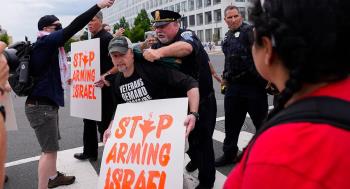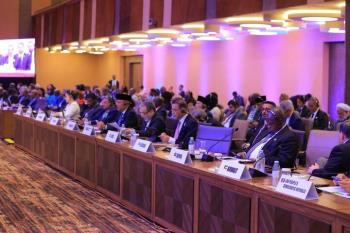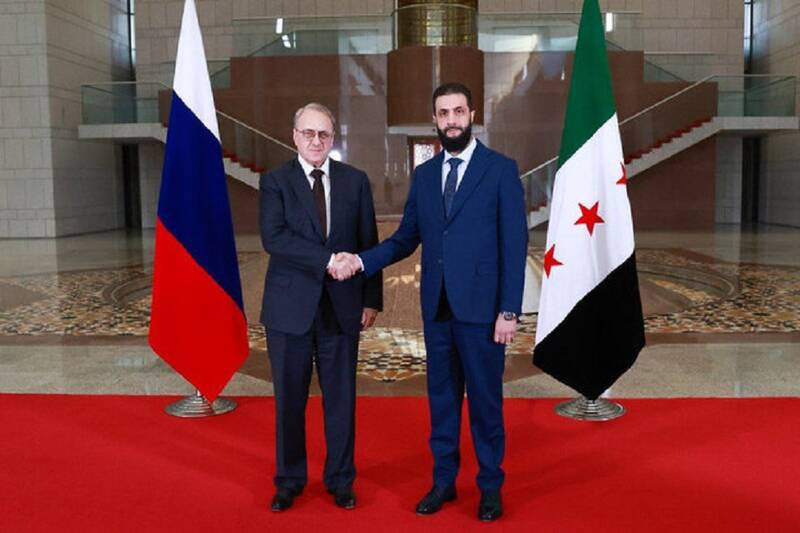Alwaght- Syrian Interim President Ahmad al-Sharaa who has been paying foreign visits in a bid to strengthen his new rule base has now embarked on a friendship with the East.
In a landmark move, al-Sharaa, better known for his nom de guerre Abu Mohammad al-Jolani, arrived at the Kremlin on Wednesday. This unprecedented visit, his first since rising to power in December last year, aims to lay a new foundation for Moscow-Damascus relations. Arab media outlets are framing the trip as a critical opportunity to negotiate the status of Russian air and naval bases in Syria and to discuss the fate of the ousted President Bashar al-Assad.
The visit comes despite the postponement of a planned Arab-Russian summit, where al-Sharaa was initially slated to meet Putin. His decision to proceed with the Moscow trip alone underscores the pressing political and security imperatives driving the Tahrir al-Sham leader's agenda for talks with the Russian president.
This diplomatic maneuver follows a high-level Russian military and political delegation's visit to Damascus in early September. Led by Deputy Prime Minister Alexander Novak, the delegation held talks with Syrian officials on key economic and security issues.
Al-Sharaa's objectives
This is the first visit of the former militia leader to Russia to mend political ties. The Syrian government's press head said that regional and international matters, development of bilateral relations, and securing common interests will be on the agenda of Al-Sharaa's meeting with his Russian counterpart Vladimir Putin. Meanwhile, Russia's Khmeimim airbase and Tartus naval base are expected to be among the most important topics of the discussions with the Russians.
The significance of this visit must be understood within the current regional context, driven by several critical factors:
First, Syria remains mired in a crisis of insecurity. Since the takeover of rule by militias in Syria, Israeli forces have repeatedly targeted the country, systematically destroying much of its military infrastructure. This ongoing situation not only threatens Syria's national security and territorial integrity but also leaves al-Sharaa's interim government, which has yet to grip over power, profoundly vulnerable. With Israel refusing to recognize his provisional authority, he is now compelled to seek a Russian safety net. He is effectively betting that by granting Moscow expanded basing rights, Russia will act as a buffer against Israeli military operations.
Al-Sharaa is hoping Moscow will retake the mediating role it played in 2018 between the al-Assad government and Israel, which temporarily de-escalated tensions in southern Syria. His objective is for Russia to once again intervene and pressure the Israeli military to withdraw from the south.
This expectation arises after security talks between the interim government and Tel Aviv, aimed at reducing hostile attacks, collapsed due to what Syrian sources describe as Israeli overreach. Furthermore, US mediation, intended to broker a deal, has effectively favored Tel Aviv, further complicating al-Sharaa's position. In this climate of crisis, the Syrian president is gambling that Moscow holds the key to unravelling these security challenges and steering Syria toward stability.
Previously, al-Sharaa had hoped that Turkey would counterbalance Israeli aggression. However, Ankara has also proven unable to restrain Israel and failed to protect the bases and military assets it provided to the interim government, which were recently destroyed in Israeli strikes. Consequently, the last diplomatic resort is Russia, in the hope that the Kremlin can provide critical support for the armed factions governing Damascus at this hard time.
Kurds' security guarantees and Russian role
Another major issue is the security crisis concerning the Syrian Kurds. Although Jolani is inclined to sign an agreement with the Kurds and integrate them into the army's structure, their demands for autonomy and regional developments have turned this into a security dilemma.
Having experienced the US's unreliability, the Kurds no longer trust its support. Meanwhile, Turkey has further destabilized northern Syria by repeatedly attacking Kurdish-held areas.
Ankara, which, unlike al-Sharaa, has its own distinct motives and interests, is demanding the Kurds surrender their weapons and demilitarize northern Syria, similar to its arrangement with the PKK. However, the Syrian Kurds, who publicly deny any cooperation or affiliation with the PKK, have refused to disarm. Unable to confront Turkey's will, al-Sharaa now hopes Moscow can mediate and persuade Ankara to retreat from its positions.
Despite al-Sharaa's efforts to develop relations with Russia, the Kremlin's leaders are also seeking to return to West Asia and preserve their historic bases in Syria, a shared interest that could drive greater convergence between the two sides. Regional Arab countries, given the current situation, have also welcomed Russia's presence in Syria as a way to counterbalance Ankara's influence in the Syrian arena.
Additionally, the visit to Moscow carries an important message for the West. Despite the formal lifting of US and European sanctions on Syria, no tangible change has occurred in the economy or reconstruction process, and the sanctions remain effectively in place. Thus, with this trip, al-Sharaa aims to show the West that if the sanctions continue to stifle progress, Damascus will pursue other options, such as deeper cooperation with Russia and China, to resolve its internal crises.
It is noteworthy that while the US Senate recently moved to repeal the Caesar Act sanctions on Syria, the House of Representatives has yet to approve the motion. Senate Republicans are now hoping to negotiate a comprehensive action with the House. In recent months, US lawmakers have tried twice to advance bills repealing the Caesar Act, but internal disagreements have stalled both efforts.
In September, the House Rules Committee blocked an attempt to include the repeal in the National Defense Authorization Act (NDAA). Syrian and regional lobbying groups had pushed for this faster-track strategy, aiming to attach the repeal to the must-pass defense budget rather than pursuing a standalone bill. The Senate subsequently proposed an amendment to the NDAA, but the House speaker stated that no such clauses will be added, dealing a serious blow to the full repeal of sanctions.
Furthermore, even if a repeal were passed via the NDAA, the State Department could reimpose the sanctions after a 12-month review. This underscores that Washington's goal is to maintain leverage over al-Sharaa's government to sway its behavior.
Consequently, without a genuine lifting of sanctions, Syria's reconstruction and investment phase will face severe hurdles. The US and European countries are unwilling to fund the rebuilding themselves and are trying to shift the financial burden onto Arab states. However, given Syria's persistent instability, these Arab partners have also refrained from taking any concrete steps over the past year. Therefore, al-Sharaa's trip to Moscow is not without reason, signaling that his government cannot rely on the empty and deceptive promises of the West.
Challenges of inviting Russia to Syria
Despite all these efforts, there are big challenge ahead of interim government of Damascus attracting Russian support and realizing its aims.
First, countering the Israeli threats with Russia's backing are not as easy as al-Sharaa may think. The fall of the power balance between Syria and Israel following the collapse of al-Assad and the ensuing destruction of the military infrastructures of the Syrian army and then success of Israel to make advances in large tracts of land in southern provinces have given Tel Aviv an upper hand on the ground. Meanwhile, it sees no serious threat posed by al-Sharaa forces. Consequently, Moscow's offer of a security guarantee is now viewed in Tel Aviv as not only unnecessary but also a potential nuisance.
Within this context, a security deal between Damascus and Tel Aviv, slated for signing in September, collapsed. The failure was primarily due to Israel's insistence on creating a land corridor connecting it to Syria's Suwayda province.
However, this was not the only sticking point. During the negotiations, the Israeli regime also demanded that the Syrian interim government completely demilitarize the provinces of Daraa, Quneitra, and Suwayda. Furthermore, Tel Aviv officials stated they would not discuss the status of the occupied Golan Heights, ruled out any return to pre-December 2024 borders, and declared their intention to maintain control over all territories captured in the preceding ten months.
So, even if Russia reasserts its presence in Syria, Israel is unlikely to retreat from its current positions. The recent tensions between Russia and Israel over the Ukraine crisis have further complicated the issue, proving that alignment with Moscow alone cannot resolve Damascus's challenges.
Furthermore, the Erdogan government remains firmly committed to its stance against the Kurds and shows no willingness to compromise. The likelihood that Russia can persuade Ankara to soften its position is therefore minimal, close to zero. Turkey's hardline approach significantly complicates any potential resolution to the Kurdish crisis.
Another critical factor is the geopolitical contest between NATO and Russia. Any significant return of Russian forces to their bases in Syria would trigger a negative reaction from the West. NATO, having spent years working to diminish Russian influence in Syria, will not permit its rival to re-enter the arena unchallenged.
Internally, powerful rebel faction leaders in Damascus, who harbor deep resentment towards Russia for its past support of al-Assad, are deeply skeptical of al-Sharaa's overtures to Moscow. This internal distrust could fuel significant internal strife. Even if he secures agreements with the Kremlin, vehement opposition from these former rebel commanders will pose a major obstacle to their implementation.
Al-Sharaa himself, despite holding the presidency post in Syria, does not enjoy adequate political and legal legitimacy on which Russia and other regional and international actors can rely. If the Kremlin leaders intend to return to Russia, they very likely should, instead of directly interacting with al-Sharaa, talk to the Arab countries, Turkey, and even Israel for an understanding of their stances on the issue.
In general, al-Sharaa's Moscow visit amid critical Syrian conditions indicates a push by the new Syrian president to consolidate the pillars of the interim government in Damascus. He is hopeful that closeness to Russia will act as a barrier to the threats posed by the neighbors, but geopolitical challenges, conflict of interests of regional actors, and weak legal and political base of al-Sharaa remain the serious hurdles in this path. Actually, it remains to see if this visit is a turning point for Syria or just a symbolic move in regional diplomacy.



























